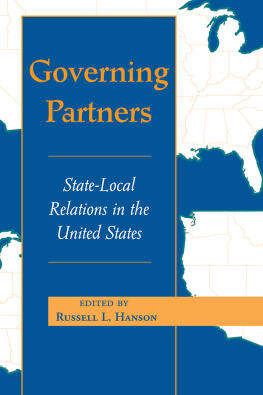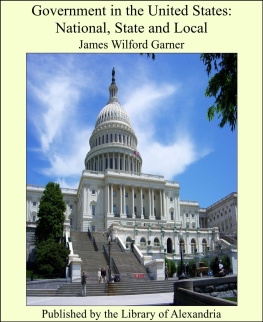Governing Partners
TRANSFORMING AMERICAN POLITICS
Lawrence C. Dodd, Series Editor
Dramatic changes in political institutions and behavior over the past three decades have underscored the dynamic nature of American politics, confronting political scientists with a new and pressing intellectual agenda. The pioneering work of early postwar scholars, while laying a firm empirical foundation for contemporary scholarship, failed to consider how American politics might change or recognize the forces that would make fundamental change inevitable. In reassessing the static interpretations fostered by these classic studies, political scientists are now examining the underlying dynamics that generate transformational change.
Transforming American Politics brings together texts and monographs that address four closely related aspects of change. A first concern is documenting and explaining recent changes in American politicsin institutions, processes, behavior, and policymaking. A second is reinterpreting classic studies and theories to provide a more accurate perspective on postwar politics. The series looks at historical change to identify recurring patterns of political transformation within and across the distinctive eras of American politics. Last and perhaps most important, the series presents new theories and interpretations that explain the dynamic processes at work and thus clarify the direction of contemporary politics. All of the books focus on the central theme of transformationtransformation in both the conduct of American politics and in the way we study and understand its many aspects.
FORTHCOMING TITLES
Masters of the House,
Roger H. Davidson, Susan Webb Hammond, and Raymond Smock
Governing Partners
STATE-LOCAL RELATIONS IN THE UNITED STATES
edited by
Russell L. Hanson
INDIANA UNIVERSITY
Transforming American Politics
First published 1998 by Westview Press
Published 2018 by Routledge
711 Third Avenue, New York, NY 10017, USA
2 Park Square, Milton Park, Abingdon, Oxon OX14 4RN
Routledge is an imprint of the Taylor & Francis Group, an informa business
Copyright 1998 Taylor & Francis
All rights reserved. No part of this book may be reprinted or reproduced or utilised in any form or by any electronic, mechanical, or other means, now known or hereafter invented, including photocopying and recording, or in any information storage or retrieval system, without permission in writing from the publishers.
Notice:
Product or corporate names may be trademarks or registered trademarks, and are used only for identification and explanation without intent to infringe.
A CIP catalog record for this book is available from the Library of Congress.
ISBN 13: 978-0-8133-2601-6 (pbk)
ISBN 13: 978-0-8133-2600-9 (hbk)
Contents
Russell L. Hanson
David C. Nice
Daniel J. Elazar
Beverly A. Cigler
Jeffrey M. Stonecash
Peter Eisinger
Daniel DiLeo
James P. Lester and Emmett N. Lombard
Timothy Tilton
Charles Barrilleaux
This volume has been several years in the making, and I have incurred several debts that should be acknowledged here. The contributors to this volume waited patiently for their work to appear in print, and I am grateful for their unwavering commitment to Governing Partners. I also want to thank Larry Dodd, editor of the Transforming American Politics series for Westview Press, for his encouragement of this project.
Governing Partners began its life at Westview Press under the able direction of Jennifer Knerr. When Jennifer left the press, Leo Wiegman assumed responsibility for the volume and skillfully brought it to completion. Under Leos direction, Ryan Goldberg and Scott Horst produced the final version of the manuscript, which benefited greatly from the copy-editing advice of Jennifer Swearingen.
At Indiana University in Bloomington, Eve Alexander patiently and carefully assembled the essays and prepared them for submission in electronic form. Mike Baumgartner traced several elusive references and improved the bibliography. Tim Tilton freely shared his insights on the interactions between state and county governments in Indiana. All of these people did their best to improve Governing Partners; any remaining errors or defects are my responsibility.
Russell L. Hanson
Bloomington, Indiana
1
The Interaction of State and Local Governments
Russell L. Hanson
State and local governments have always been important in American politics. Even when the national government assumed a leading role in domestic policymaking during the 1960s and 1970s it did not act on its own, except in the area of civil rights. Instead, Congress and the president pursued their objectives through grants-in-aid, which created powerful incentives for state and local governments to expand the range of goods and services they provided to citizens. Hence, many national policies actually involved a partnership of national, state, and local governments. The national government was undoubtedly the senior partner in these programs, but state and local governments enjoyed policymaking powers, too. They were not silent partners so much as they were powerful members of the board of directors advising the CEO.
Indeed, that is precisely why critics of big government want to return policymaking responsibilities to states and localities. Devolution is attractive only if state and local governments are capable of exercising power effectively and fairly. This capacity varies from state to state and from place to place within states. Nevertheless, there has been a general increase in the political, administrative, and financial capacity of subnational governments in the United States over the past three decades. This process of development was originally spurred by grants from the national government, but it now has considerable momentum of its own. In fact, state and local governments are at the forefront of efforts to reinvent government in the 1990s.
We will soon know if the development of state and local governments is self-sustaining because financial problems are causing the national government to limit its role in domestic policymaking. The social responsibilities of the national government are no longer expanding; expensive new initiatives, for example, comprehensive public health insurance, are out of the question and have been for some time. In fact, national power is waning as Washington tries to make ends meet. The deficit has been a serious problem for more than a decade, and both political parties have pledged to eliminate it by 2002. This will require spending cuts since both parties have promised tax relief, too. The cuts will fall disproportionately on discretionary spending in the budget; defense spending will probably not be reduced by much, and retirement benefits will almost certainly be spared for political reasons. Since these two items account for the lions share of the budget, cuts will be concentrated in grant programs that benefit state and local governments.
Retrenchment at the national level is not merely a fiscal imperative; it is also a function of recent political developments. Congressional Republicans are in the ascendance, and their Contract with America envisions much less government overall. The Contract further stipulates that functions remaining in government hands should be devolved to the states whenever possible. New Democrats such as President Bill Clinton share this inclination, though not to the same degree or with the same fervor as their conservative counterparts. Because of this bipartisan sentiment, states are likely to become even more important in years to come. Welfare reform, the first truly significant devolution of power, will certainly not be the last transfer of policymaking control. We can expect the states to assume primary responsibility for a number of key problems, including economic development, educational reform, and environmental regulation. Indeed, states have already asserted themselves in these areas.












